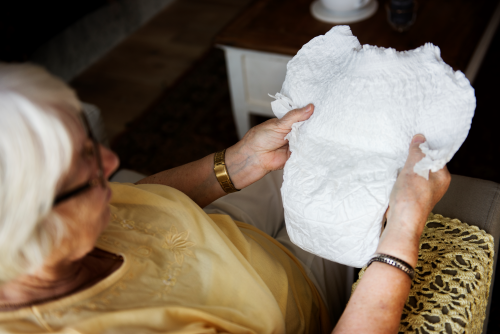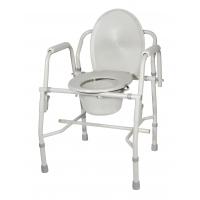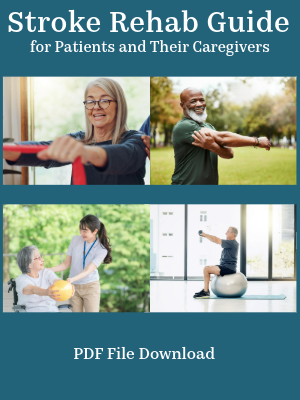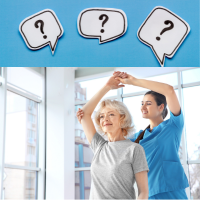Bowel and Bladder Incontinence After Stroke
Medically reviewed by Karen Murray, OT, CHT, CSRS - written by Stroke-rehab.com
 Image by rawpixel.com on Freepik
Image by rawpixel.com on FreepikBowel and bladder incontinence after stroke is common and is often indicative of the severity of stroke. Incontinence is the inability to control urinary and bowel function and often impacts where a patient will be discharged when leaving the acute hospital. Urinary incontinence can affect 40-60% of people admitted to hospital after a stroke, with 25% still having problems when discharged from hospital and 15% remaining incontinent after one year.1 Stroke patients with incontinence are less likely to be discharged to home and are more likely to be discharged to another facility for continued care.
Studies show that stroke survivors that are continent the first few days after stroke have a much lower mortality rate in comparison to those who experience bowel and bladder incontinence.2 Incontinence negatively affects stroke patients and often increases the burden on caregivers. Control of bowel and bladder improves for the majority of stroke survivors with time but some will remain incontinent.
Incontinence may be due to stroke in part of the brain affecting bowel and bladder function or it may be a side effect that is due to other factors such as physical disability (patient is unable to physically get to the bathroom), aphasia and cognitive problems (stroke patient may be unable to communicate that he or she needs to use the bathroom), or ataxia. Stroke may worsen incontinence for stroke patients who were already experiencing bladder or bowel dysfunction prior to stroke. This may be especially true for elderly stroke victims since there is a higher incidence of urinary dysfunction in the elderly population. Drugs given post stroke can also be a factor in incontinence.
Bowel and Bladder Incontinence Treatment

Initially, the stroke victim who is incontinent may receive an indwelling catheter (a small flexible tube is inserted in the urinary tract and urine is collected in a bag). Treatments after the catheter is removed may include a toileting schedule, medication, bladder retraining, behavioral therapy, use of adaptive equipment, improving physical mobility, and improving speech and cognition.
There are limited studies on the effectiveness of treatments for incontinence after stroke, but the following are some tips to help with bladder/bowel retraining and incontinent episodes:
- Establish a toileting schedule (i.e. - set a timer for every 2 hours to go to the bathroom which helps train the bowel and bladder)
- Improve physical mobility and transfers to the toilet (an occupational therapist can address this during therapy sessions)
- If mobility is an issue, invest in adaptive clothing which allows for clothing to be changed from a seated position.
- Work on improving communication so that the stroke patient can express the need to go to the bathroom (a speech therapist can help with this)
- Devise a communication method between caregiver and stroke patient if the patient is unable to verbalize the need to urinate (i.e. a bell or calling system)
- Practice Kegel exercises which strengthen the pelvic floor.
- Use a bedside commode to make it easier to get to the bathroom quickly at night
- Ask your physician about medications for overactive bladder
- Examine medications with your M.D. to make sure they are not causing urinary or bowel problems
- Notify your caregiver of the need to urinate or move your bowels as soon as it comes on - waiting can lead to accidents.
- Limit fluids in the evening before bed
- Limit caffeine
- Use disposable undergarments or pantiliners
- Purchase washable waterproof pads for use on beds or furniture (furniture covers can be used over the pads to make them less conspicuous)
- Carry an extra set of clean garments when leaving the house (keep extra set in car at all times)
- Schedule extra time for outings due to more frequent restroom breaks
- Carry wipes and hand sanitizer with you at all times
Incontinence Products
You can find incontinence products online and some supplies at big box stores as well.
As an Amazon Associate I earn from qualifying purchases.
Incontinence Resources
For more info on incontinence, visit the National Association for Incontinence website at www.nafc.org.
Sources
1Thomas, Lois H et al. “Interventions for treating urinary incontinence after stroke in adults.” The Cochrane database of systematic reviews vol. 2,2 CD004462. 1 Feb. 2019, doi:10.1002/14651858.CD004462.pub4
2Rotar, Melita et al. “Stroke patients who regain urinary continence in the first week after acute first-ever stroke have better prognosis than patients with persistent lower urinary tract dysfunction.” Neurourology and urodynamics vol. 30,7 (2011): 1315-8. doi:10.1002/nau.21013
Get Our Stroke Rehab Guide

Our comprehensive stroke rehab guide in pdf format is designed for both patients and caregivers who want clear, practical ways to support recovery, improve daily function, and regain independence at home. It includes
- Rehab exercises with pictures for safe home practice
- Physical, occupational, and speech therapy guidance
- Tips for daily activities and adaptive equipment
- Answers to common questions from patient and caregivers
- Information on stroke causes, treatment, and prevention
A single therapy visit can run $150 or more. The Stroke Rehab Guide is only $14.99, and includes a pdf guide you can continue to refer to in the future with exercises and information on stroke recovery. In addition, any time an update or new version of the guide is written, you will get the updated version for free.

About the Author
Karen Murray, OTR, CHT, CSRS, is a licensed occupational therapist, Certified Stroke Rehabilitation Specialist, Certified Hand Therapist, and Certified Personal Trainer with over 29 years of experience working with stroke survivors in hospital, outpatient, and home settings. She founded Stroke-Rehab.com to help patients and caregivers better understand stroke recovery, find evidence-based resources, and regain independence at home.
Medical Disclaimer: All information on this website is for informational purposes only. This website does not provide medical advice or treatment. Always seek the advice of your physician or other healthcare provider before undertaking a new healthcare or exercise regimen. Never disregard professional medical advice or delay seeking medical treatment because of something you have read on this website. See the disclaimer page for full information.
![Chucks Pads Disposable [50-Pack] Underpads 23x36 Incontinence Chux Pads Absorbent Fluff Protective Bed Pads, Pee Pads for Babies, Kids, Adults & Elderly | Puppy Pads Large for Training Leak Proof](https://m.media-amazon.com/images/I/51Xgn29yo7L._SL160_.jpg)















